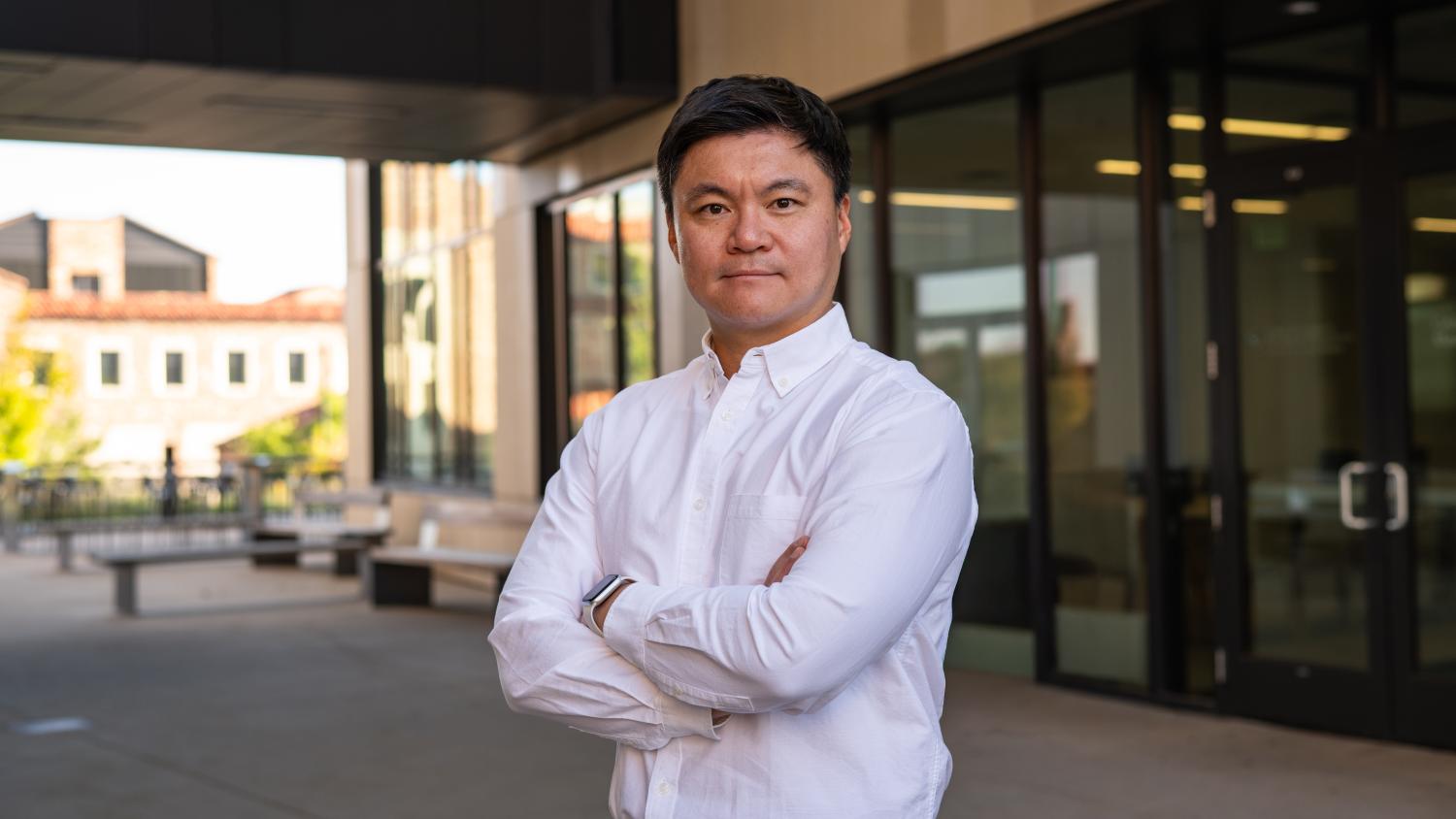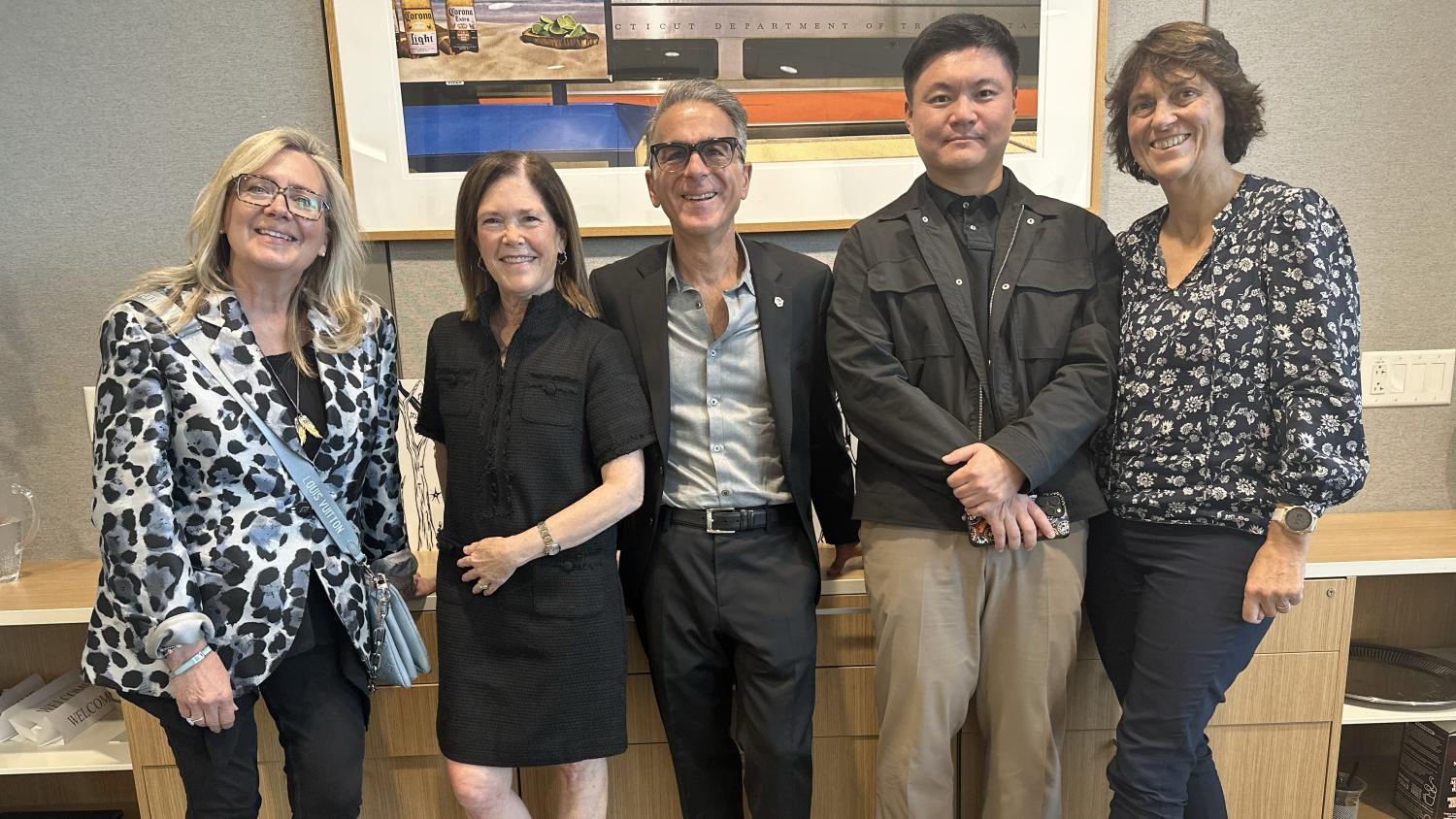No ifs, ands or buts. (Bots, on the other hand…)

WooJin Kim, an assistant professor of advertising, studies the potential of artificial intelligence to influence positive social behavior. That work led to Kim’s appointment as CMDI’s first DeLuca Faculty Scholar in Advertising earlier this fall. Photo by Nathan Thompson.
Growing up in Ansan, South Korea, WooJin Kim was heavily influenced by his family. While his parents made sacrifices in order to send him to college—the first in his family to do so—it was the values he drew from his grandfather, a pastor, that shaped his experiences as a student and researcher.
“He always encouraged me to help others and to support my community and society,” said Kim, an assistant professor of advertising at the College of Communication, Media, Design and Information at CU Boulder. “It’s why I first started looking at the potential for advertising to shape and influence human behavior, especially through advanced technology.”
Kim studies how artificial intelligence—in the form of chatbots and personalized advertising content—can position the right message in front of the right audience to drive social behavior, such as encouraging people to adopt sustainable practices, get vaccines, donate to worthwhile causes—even stop cyberbullying among students.
It’s work that led to Kim’s appointment as CMDI’s first DeLuca Faculty Scholar in Advertising earlier this fall. Kim’s work in A.I. and his impressive track record of publications—his work has been featured in the prestigious Journal of Advertising as well as the Journal of Business Ethics, Journal of Business Research and others—led to this three-year appointment within the Department of Advertising, Public Relations and Design.
Kim called the endowed position “a great honor that shows my research has the potential to contribute to the college and the community.”
“The more he’s able to understand—and teach—the power behind A.I., the more I can see students understanding what a wide net they can cast with it.”
Peter DeLuca (StratComm’83)
Getting Kim’s work beyond the campus is something Wendy and Peter DeLuca (StratComm’83) hope their gift makes possible.
“I enjoy talking to students when I go back and visit the campus, and this research really showcases a way to apply A.I. in a way that changes the conversation around it,” said Peter DeLuca, a retired chief creative officer and senior vice president with T-Mobile and a member of the college’s advisory board. “The more he’s able to understand—and teach—the power behind A.I., the more I can see students understanding what a wide net they can cast with it. This will help change the conversation from just displacing people or replacing jobs.”
An international perspective
Kim first became interested in the potential of advertising to positive shape human behavior as a high school student growing up in conservative South Korea. International students visiting from places like Bangladesh, the Philippines and Indonesia showed him how diverse points of view benefited schoolwork and friendships, “which made me very curious about how I could change attitudes and raise awareness about important social issues related to diversity,” he said.
Now, as generative artificial intelligence rewrites the playbook for advertising, Kim said he sees ethical, responsible use of those tools as key to building a better society.
One example he studies is A.I. chatbots.
“During interactions between humans and chatbots, the A.I. agents can access and collect our personal data, which can raise ethical issues and privacy concerns,” Kim said. “But at the same time, by analyzing our data—education, income, demographic information—they can identify target audiences and offer personalized, pro-social messages that benefit health outcomes and the environment.”
Generative A.I. has set off waves in the creative and communication communities, as ethical, legal, privacy and other concerns disrupt the ways we gather, analyze and share information. It’s why Lori Bergen, founding dean of the college, is excited to see how this appointment helps unlock additional insights from Kim.
“What makes our college special are the interdisciplinary insights our faculty bring to new and complex problems,” Bergen said. “WooJin’s work in advertising and A.I. promises to help us rethink how new tools and evolving techniques can positively influence public discourse.”
Breaking the black box
Better literacy around artificial intelligence, Kim said, is key to unlocking its potential as an agent for positive social change. It’s why he’s excited for the DeLuca endowment, which will allow him to do more work in algorithmic transparency.
“We need a better understanding of A.I. and a better ability to critically evaluate and understand knowledge and information generated by this technology,” he said.
“I know we can use A.I. to help others, but A.I. and its underlying mechanisms are a black box. If we could build in additional transparency, so that people understand how the underlying mechanisms work, it would change how they interact with and use such tools, and influence how likely they are to accept A.I.-generated decisions.”
The DeLucas, who also sponsor scholarships at CMDI, said they hope that work helps change the way students behave online.
“He’s a great teacher who clearly loves being in the classroom,” said Wendy DeLuca, who worked in finance before devoting herself to raising her family and extensive volunteer service. “If he could just influence a handful of his own students through what he’s learning from this research, it will be impactful.”
“Bullying does not stop when you get out of high school—in some ways, it can be worse in college,” Peter DeLuca said. “We wanted to support this research because it’s an opportunity to touch an individual who then can touch multiple students, and create long-lasting impact that’s felt throughout the college and beyond.”

From left, Dean Lori Bergen, Wendy DeLuca, Peter DeLuca, WooJin Kim and Kay Weaver, chair of the APRD department, gathered to give the DeLucas a chance to meet the recipient of the endowed position they created. ‘If he could just influence a handful of his own students through what he’s learning from this research, it will be impactful,’ Wendy DeLuca said.
Joe Arney covers research and general news for the college.

